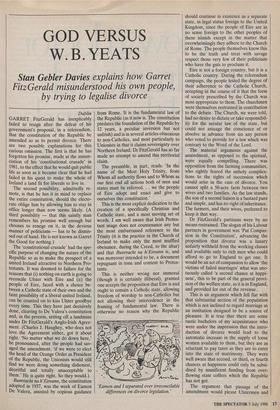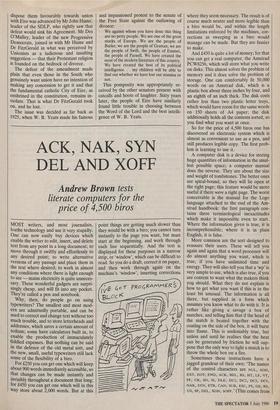GOD VERSUS W. B. YEATS
FitzGerald misunderstood his own people, by trying to legalise divorce
Dublin GARRET FitzGerald has inexplicably failed to resign after the defeat of his government's proposal, in a referendum, that the constitution of the Republic be amended so as to permit divorce. There are two possible explanations for this curious omission. The first is that he has forgotten his promise, made at the annun- ciation of his 'constitutional crusade' in 1981, to the effect that he would quit public life as soon as it became clear that he had failed in his quest to make the whole of Ireland a land fit for liberals to live in.
The second possibility, admittedly re- mote, is that he has it in mind to replace the entire constitution, should the electo- rate oblige him by allowing him to stay in office longer than now seems likely. (A third possibility — that this saintly man remembers his promise well enough but chooses to renege on it, in the devious manner of politicians — has to be dismis- sed out of hand. He is not known as Garret the. Good for nothing.) The 'constitutional crusade' had the spe- cific purpose of changing the nature of the Republic so as to make the prospect of a united Ireland attractive to Northern Pro- testants. It was doomed to failure for the reasons that (i) nothing on earth is going to reconcile Ulster with Eire and (ii) the people of Eire, faced with a choice be- tween a Catholic state of their own and the faint possibility of a liberal united Ireland, can be counted on to kiss Ulster goodbye every time. This they have just decisively done, cleaving to De Valera's constitution and, in the process, setting off a landmine under Dr FitzGerald's Anglo-Irish Agree- ment. (Charles J. Haughey, who does not love the Agreement either, got it about right. 'No matter what we do down here,' he pronounced, after the people had sav- aged the amendment, 'if we were to elect the head of the Orange Order as President of the Republic, the Unionists would still find we were doing something dishonest, deceitful and totally unacceptable to them.' He is quite right. So they would.) Bunreacht na h'Eireann, the constitution adopted in 1937, was the work of Eamon De Valera, assisted by copious guidance from Rome. It is the fundamental law of the Republic (as it now is. The constitution predates the foundation of the Republic by 12 years, a peculiar inversion but not unIrish) and is in several articles obnoxious to non-Catholics, and most particularly to Unionists in that it claims sovereignty over Northern Ireland. Dr FitzGerald has so far made no attempt to amend this territorial claim.
The preamble, in part, reads: 'In the name of the Most Holy Trinity, from Whom all authority flows and to Whom as our first end all actions both of men and states must be referred. . . we the people of Eire adopt and enact and give to ourselves this constitution.'
This is the most explicit dedication to the creation of a specifically Christian and Catholic state, and a most moving set of words. I am well aware that Irish Protes- tant usage does not countenance any but the most embarrassed reference to the Trinity (it is the practice in the Church of Ireland to make only the most muffled obeisance, during the Creed, to the altar) and that Bunreacht na h'Eireann is, and was moreover intended to be, a document repugnant in tone and content to Protes- tants.
This is neither wrong nor immoral (though it is certainly illiberal), granted one accepts the proposition that Eire is and ought to remain a Catholic state, allowing freedom of worship to non-Catholics but not allowing their intercedence in the framing of fundamental law. There is otherwise no reason why the Republic `Eamon and I separated over irreconcilable differences on divorce legislation.' should continue in existence as a separate state, in legal status foreign to the United Kingdom, since the people of Eire are in no sense foreign to the other peoples of these islands except in the matter that overwhelmingly they adhere to the Church of Rome. The people themselves know this to be the truth and treat with savage respect those very few of their politicians who have the guts to proclaim it.
Eire is not a foreign country, but it is a Catholic country. During the referendum campaign, the people tested the degree of their adherence to the Catholic Church, accepting in the course of it that the form of society prescribed by the Church was most appropriate to them. The churchmen were themselves restrained in contribution to the debate. The Church, we were told, had no desire to dictate or take responsibil- ity for the secular law of the state, but could not assuage the conscience of or absolve in advance from sin any person who voted to provide for a law which was contrary to the Word of the Lord.
The material arguments against the amendment, as opposed to the spiritual, were equally compelling. There was opposition from the farming communities, who rightly feared the unholy complica- tions to the rights of succession which would arise in the case of divorce. You cannot split a 50-acre farm between two wives and two families. As the law stands, the son of a second liaison is a bastard pure and simple, and has no right of inheritance. The farmers, and their wives, preferred to keep it that way.
Dr FitzGerald's partisans were by no means restrained. The slogan of his Labour partners in government was 'Put Compas- sion in the Constitution', advancing the proposition that divorce was a luxury unfairly withheld from the working classes and available only to rich men who could afford to go to England to get one. It would be an act of compassion to allow 'the victims of failed marriages' what was unc- tuously called 'a second chance at happi- ness', this to be part of the general provi- sion of the welfare state, as it is in England, and provided for out of the revenue.
This is an argument which fell flat with that substantial section of the population which is not inclined to regard marriage as an institution designed to be a source of pleasure. It is true that there are some rustic bachelors of my acquaintance who were under the impression that the intro- duction of divorce would lead to the automatic increase in the supply of loose women available to them, but they are as reluctant to pay taxes as they are to enter into the state of matrimony. They were well aware that second, or third, or fourth chances at happiness could only be subsi- dised by munificent funding from over- flowing state coffers which the Republic has not got.
The argument that passage of the amendment would please Ulstermen and dispose them favourably towards union with Eire was advanced by Mr John Hume, leader of the SDLP, who rightly saw that defeat would sink his Agreement. Mr Des O'Malley, leader of the new Progressive Democrats, joined in with Mr Hume and Dr FitzGerald in what was perceived by Unionists as a ludicrous and insulting suggestion — that their Protestant religion is founded on the bedrock of divorce.
The defeat of the amendment made plain that even those in the South who genuinely want union have no intention of making any concession to get it and that the fundamental catholic City of Eire, as enshrined in the constitution, remains in- violate. That is what Dr FitzGerald took on, and he lost.
The issue was decided as far back as 1925, when W. B. Yeats made his famous and impassioned protest to the senate of the Free State against the outlawing of divorce:
We against whom you have done this thing are no petty people. We are one of the great stocks of Europe. We are the people of Burke; we are the people of Grattan; we are the people of Swift, the people of Emmet, the people of Parnell. We have created the most of the modern literature of this country. We have created the best of its political intelligence. . . my children will be able to find out whether we have lost our stamina or not.
This pomposity was appropriately re- ceived by the other senators present with catcalls and hoots of laughter. Sixty years later, the people of Eire have similarly found little trouble in choosing between the Word of the Lord and the best intelli- gence of W. B. Yeats.



















































 Previous page
Previous page